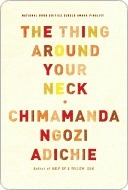More on this book
Community
Kindle Notes & Highlights
It is one of the things she has come to love about America, the abundance of unreasonable hope.
“You speak such good English,” he said, and it annoyed her, his surprise, his assumption that English was somehow his personal property.
Tobechi called to say that his green card was on the table in front of him and that it was not even green.
You did not know that people could simply choose not to go to school, that people could dictate to life.
You shook your hand free, suddenly annoyed, because he thought the world was, or ought to be, full of people like him.
She wanted to interrupt and tell him how unnecessary it was, this bloodying and binding, this turning faith into a pugilistic exercise; to tell him that life was a struggle with ourselves more than with a spear-wielding Satan; that belief was a choice for our conscience always to be sharpened.
Was it God?
She wished he would leave, now that they had prayed, but he moved across into the living room and sat down on the couch and began to talk about how he first heard of the plane crash as if she had asked him to stay, as if she needed to know the details of his morning ritual, that he listened to BBC News online because there was never anything of substance in American news.
He was always struggling to be different, even when it didn’t matter. It was as if he was performing his life instead of living his life.”
How can you love somebody and yet want to manage the amount of happiness that person is allowed?”
They did not say hello in the hallways or elevators, nor did they meet one another’s eyes during the five-minute ride on the campus shuttle, these intellectual stars from Kenya and China and Russia, these graduate students and fellows who would go on to lead and heal and reinvent the world.
Something about the way Chinedu said his name, Abidemi, made her think of gently pressing on a sore muscle, the kind of self-inflicted ache that is satisfying. He
“How can a person claim to love you and yet want you to do things that suit only them? Udenna was like that.”
it was as if Chinedu could conceive of faith only in extremes, as if an acknowledgment of a middle ground would mean the risk of losing everything.
Judging from the lines that ran across her face, she could have been anything from six decades to eight decades old; I had not seen enough white people to correctly gauge their ages.
“Oh,” I said and shook my head; she, a black American, had chosen an African name, while my husband made me change mine to an English one.
He spoke about their god, who had come to the world to die, and who had a son but no wife, and who was three but also one.
and did they not know that the white man’s slavery was very different, that people were treated like goats, taken on large ships a long way away and eventually eaten?
He awoke to find a white man rubbing his feet with oil, and at first he was terrified, certain that he was being prepared for the white man’s meal.
It was Grace who would read about these savages, titillated by their curious and meaningless customs, not connecting them to herself until her teacher, Sister Maureen, told her she could not refer to the call-and-response her grandmother had taught her as poetry because primitive tribes did not have poetry.
stories she was not sure she believed, because they also told stories of mermaids appearing from the River Niger holding wads of crisp cash.
New Haven smelled of neglect.
with the familiarity strangers adopt with each other after sharing in the disappointment of a public service.


